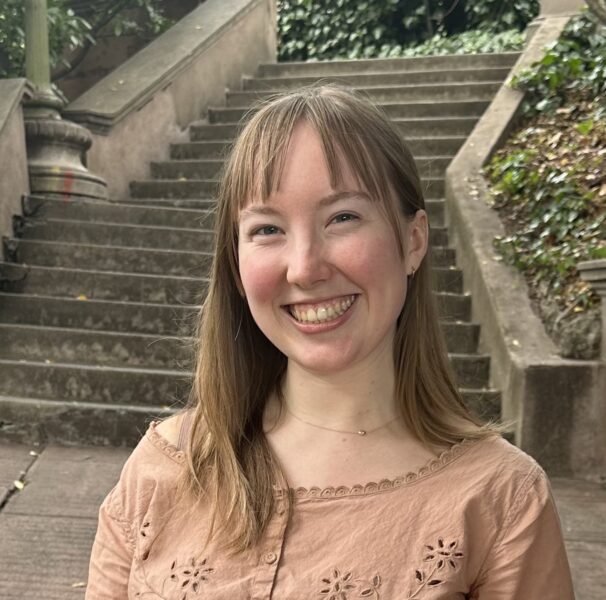
Two UC Berkeley graduate students — Emma Bates and Tanya Bertone — have been selected to receive the 2024 Dr. Iris Hui Memorial Graduate Student Scholarship.
Established in 2021, this scholarship honors the vision and goals of Dr. Iris Hui, a PhD graduate of Political Science from UC Berkeley. Family and friends raised funding for this memorial scholarship in Dr. Hui’s name to support researchers and students tackling issues that meant so much to her — urgent, real-world problems facing all of us, including the governance of natural resources, climate change, political empowerment, and migration. As a former graduate student herself, Dr. Hui understood how funding like this can benefit graduate students.
Social Science Matrix is honored to be chosen as the institutional home for this memorial scholarship. Visit this page for more information.
Emma Bates

Emma Bates is a first-year PhD student in the History Department. She studies 20th-century American history, with particular focus on the power grid, publicly-owned utilities, and energy security. She is also in the Political Economy Designated Emphasis. She studied history as an undergraduate and obtained her BA with Honors from Stanford University in 2022. She has spent over five years as a research assistant working on numerous projects related to national and international security.
Research Abstract
President Roosevelt’s Rural Electrification Administration brought electricity to tens of millions of American families from the 1930s to the 1950s, completely reshaping the landscape of American power. Yet this undertaking bypassed Native American communities on reservations, resulting in substantial disparities in grid infrastructure access.
The present-day exclusion of Native communities from the grid has often been attributed to reservations’ rural geographies and their subsequent distance from existing transmission infrastructure. Yet this explanation does not adequately explain the scarcity of grid infrastructure projects on reservations in the prewar periods. My project investigates the exclusion of Native American reservations in the rural electrification projects in Washington State, which pioneered some of the first public power initiatives — and most Roosevelt-era electrification projects — in the American West.
Using archives situated across the state, this project will look at how American federal, state, and city governments, Native governments, and both publicly and privately owned utilities navigated this topic. It seeks to uncover how each of these entities navigated questions of sovereignty, responsibility, and power. The American grid today reflects the infrastructural choices of this period. An understanding of the inchoate grid is thus vital in explaining the energy security problems we face today.
Tanya Bertone

Tanya Bertone is PhD student in Anthropological Archaeology at UC Berkeley, with a designated emphasis in Global Metropolitan Studies. Her research explores housing development, displacement, and placemaking within the larger coastal California landscape. Her dissertation centers on a contemporary archaeological analysis of two mobile home parks, as well as the perspectives and lived realities of their residents. Tanya was a transfer student from Pasadena City College, earning her BA in Anthropology at UC Irvine and her MA in Anthropology at UC Berkeley.
Research Abstract
Mobile homes occupy a liminal space of vulnerability in a capitalist frame. Precarity of tenure (residents may not hold rights to the land under their homes) and designed obsolescence (through the use of less durable building materials and techniques) have played a key role in the exclusion of these spaces from an in depth archaeological analysis, which also serves as justification for it.
This project aims to better understand the lasting impacts of contemporary housing and development decisions on communities by asking challenging questions. How do different entities value the archaeological record and make use of it in shaping the present? What types of value is placed on heritage and how do these designations serve communities? Do mobile home parks trouble our notion of what qualifies as a historic landscape?



